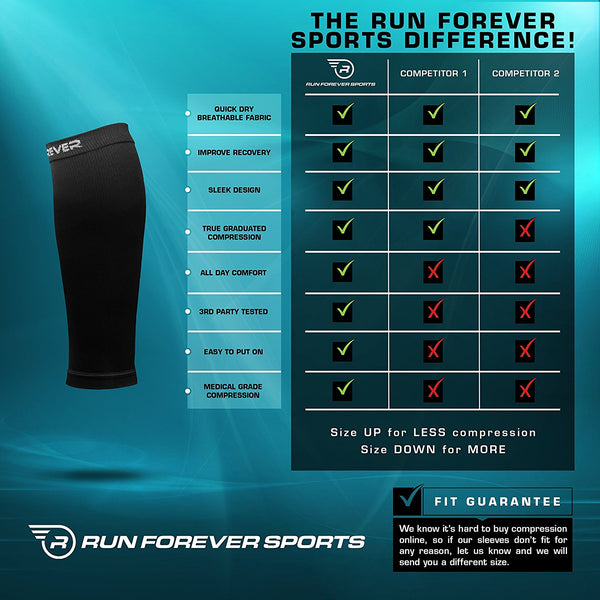Your Cart is Empty

Calf Compression Sleeves or Compression Socks? Which are right for you? Is there a difference? Let's find out!
You'll notice on any packaging or product descriptions for compression socks and calf compression sleeves there are always a few numbers. You'll usually see 20-25 mmHg or 20-30 mmHg. What do those numbers mean? According to Medicine Net: "mmHg means millimeters of mercury, the height of a column of mercury, as in a blood pressure reading." So basically those numbers tell us how much compression we are getting.
The first number represents the amount of compression toward the top of the sock or sleeve. The second number indicates the amount of compression near the bottom of the sock or sleeve. For example, Run Forever Sports Calf Compression Sleeves feature 20-25mmHg, and our compression socks have 20-30 mmHg. So from the bottom, our socks have 30 mmHg and that is reduced as we move up the sock and it ends just below the knee at 20 mmHg.
So there will always be more compression at the bottom because we want to get that blood moving back toward the heart. Compression increases blood flow, which is why it's used so often to assist in healing injuries, or even preventing them, like shin splints.
RELATED: BEST COMPRESSION SLEEVES FOR SHIN SPLINTS

First and foremost, if you have consulted with a physician, you should take their recommendations for which type of compression socks you should purchase. If you wear calf compression sleeves or socks for running and athletics, usually the standards (20-25 mmHg, 20-30 mmHg) work very well. The most important part is making sure you get the proper fit for compression socks.
For runners and athletes, they will find relief and faster recovery with either calf compression sleeves or socks. But there are certain types of people who should be wearing compression socks because blood will pool near their ankles and feet.
These people should be wearing compression socks because all that blood has to be helped back up the body toward the heart. That's why you feel "tired legs." It's not just all the standing or working you've been doing. It's that blood has settled and circulation is poor because gravity remains undefeated. The socks have more compression at the bottom of the foot and that helps increase blood flow. When blood flow increases, muscles are super happy! Think about it: we always warm up before running or sports to "get the blood going." Compression helps us do that!
Some runners prefer calf compression sleeves to compression socks because they have a favorite pair of running socks, or because they are trail racers or obstacle course runners and want to have a lighter sock that wicks away moisture and wetness. Compression socks can also generate heat and in the summer months, some long distance runners prefer to wear calf compression sleeves with their favorite brand of running sock.
Some runners will actually use both at the same time if they are running in cold weather.
Why do some doctors recommend compression socks for pregnant women? If you have poor circulation, you are at risk for a number of different ailments: swelling, varicose veins, blood clots, even Deep Vein Thrombosis is a possibility. Pregnant women have increased blood volume, which means there is more to move throughout the body. Also consider that in their final trimester, pregnant women are not as active as they have been in the first two trimesters of the pregnancy, which means they are moving less so blood circulation is slowed.
The increased blood volume means both mother and child are at risk for elevated heart rates during pregnancy. The heart has to work harder because there is more blood to move. If a pregnant woman has poor circulation, that blood will stay near the ankles and in the feet. Most pregnant women will suffer from swollen feet, sore legs, and even the development of varicose veins. Compression socks assist that blood in circulating back toward the heart which means the heart does not have to work as hard. It also means you will have less pain and you will keep away those varicose veins.
Looking for more information on who should wear compression socks? Just click the link. You'll find there are many applications for calf compression sleeves and compression socks. Get yours now here at Run Forever Sports!